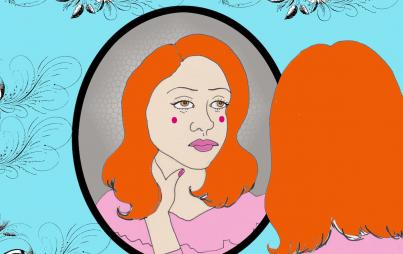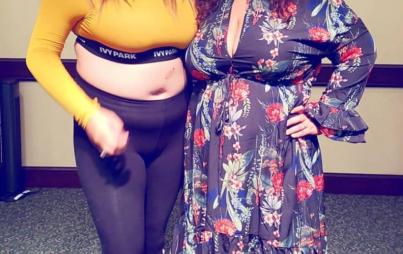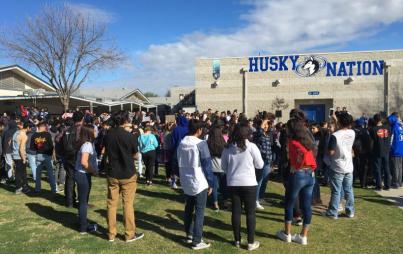
Savana Vernon and Elizabeth Elrod
"When students suffer sexual assault and harassment, they are deprived of equal and free access to an education." -ACLU
— elizabeth (@bunnybun51) July 26, 2018
The thing about a woman’s assault or harassment being swept under the rug is it’s never a surprise. By now, neck-deep in third wave feminism, I’d hope it would be, but every time a new story surfaces we let out a collective cultural gasp only to have it happen again and again. I’d have hoped my daughters would become adults in a culture where they were honored and respected, where their experiences of assault or harassment were acknowledged and met with compassionate care and action. There has been change in my 44 years, but not enough.
If you’re paying attention to the news, you’ll see this happening all over the world, from across the globe to your own backyard. And yet, it rarely fails to shock us when we hear another story of another woman (or group of women) being ignored or shamed, cast aside, or silenced.
Last week a group of young women from my community came forward with shocking stories of harassment, slut-shaming, and even more shocking stories of the failure of trusted staff, administrators, even local police, casting their abuse aside without regard for the immediate and long-term damage it will inevitably have on all of them.
“Lemoore Union High School District forced me to consider the future of my assailaint. Fuck his future. What about mine?”
— Savana (@princessvana_) July 26, 2018
My 23-year-old daughter sent me a link to a Twitter moment, which led me to another young woman, and finally to the two young women who bravely came forward to share their own experiences of victimization, encouraging others to do the same.
Made a moment so it’s easier to see and share all the information that’s coming forward. Feel free to @ me or dm me and I can add your story to the list. LUHSD is destroying the lives of their students and they must be held accountable. https://t.co/Ml12Y1Yvzz
— Savana (@princessvana_) July 24, 2018
Elizabeth Elrod and Savana Vernon, two young women, 19 and 20 years old respectively, who each graduated with not only a diploma but also trauma that will take much longer to heal than their years spent in high school.

I spent time considering how I’d share their stories. I’m not an investigative journalist; I’m primarily a personal essay writer. But I’m also a mother with a child who has experienced sexual assault and subsequent dismissal of her suffering. I am a woman who was a victim of sexual assault who was told my experiences were exaggerated, who was silenced, even by other young women for whom the discussion of assault was too painful to address. And I am a person who is lucky enough to have a platform that allows me to share the stories of others, and in this case, the stories of a group of young women suffering at the hands of not only their assailants but the adults whose job it is to protect them.
So, rather than detail their experiences myself, I’m here to facilitate the telling through their words. They have been silenced enough.
I encourage you to read their stories, as painful as it may be to acknowledge that these things are happening to our daughters, in our high schools, right under our noses. I encourage you to share their stories, for in sharing there is strength, and in strength there is healing. I encourage you to mobilize for policy change, not only with these young women but with young women around the country being shamed and silenced.
Elizabeth Elrod
It all started with a tweet. I tweeted “My school cared more about me not wearing a bra than me experiencing sexual harassment on campus,” on July 20.
My high school cared more about me not wearing a bra than me experiencing sexual harassment on campus. My school did nothing, and on the same day one of those boys was arrested, I was called in for dress code. There's more.
— elizabeth (@bunnybun51) July 20, 2018
I had no idea my experience was in no way unique amongst the students of the Lemoore Union High School District. Within a few days, my longtime friend, Savana Vernon, and I had compiled nearly 30 similar stories from current students and alumni alike. Our petition had more than 550 signatures.
We weren’t trying to start a revolution, but if #MeTooLUHSD prevents one girl from experiencing sexual assault on campus, or provides one girl with the comfort of knowing that she’s not alone, that’s considered revolutionary to me. The LUHSD continues to systematically violate Title IX guidelines, and fails to provide an equal education to students afflicted by sexual harassment and assault. Savana and I, the co-founders of #MeTooLUHSD, refuse to back down until all faculty members who deny students the right to safe learning environments are exposed.
My Experience
I was harassed all four years of my high school experience. Despite graduating with a 4.3 GPA, I was never treated fairly by my male teachers. I was never considered one of the "smart kids." After being ostracized by my peers, I never felt comfortable speaking in class. If I knew the answer, I would never raise my hand. I was so paranoid; I felt like everyone was talking about me, judging me. Often I would spend my nights receiving threatening text messages from fellow students, which hindered my studying. When you're sitting feet away from your assaulter, how can you focus in class?
My peers saw me as the stereotypical blonde cheerleader. My sophomore and junior years were the lowest points of my life. A lot of older boys would text me vulgar things, or send me sensitive pictures of themselves. Of course, I felt violated. I reported a particular instance to my principal, Chuck Gent, and little action was taken, at which point my mother went to the principal. (My mom complained numerous times throughout my high school experience) She demanded the boy be removed from my physical education class. This, to my knowledge, was his only punishment; however, multiple girls had complained about him.
After a month, he started sneaking back into my class. He would stare at me while I worked out. I reminded my P.E. coach, Frank Ramos, multiple times that the boy should not be in the class. When I complained that the boy was staring at me, my coach told me to stop wearing yoga pants because it was a "distraction." The school did have a P.E. uniform, unisex t-shirt and basketball shorts, which was in no way strongly enforced. Most girls felt more comfortable wearing yoga pants, so that was the norm. I felt the comment was sexist and unfair. Not only was I silenced, but now I was being asked to appease my harasser.
Rumors spread. I was slut-shamed. I noticed the more I complained to the faculty, the more I was slut-shamed by my fellow peers. At this time, I started being sent to the office frequently for dress code violations. It felt like the male teachers were almost buying into the slut shaming. I always tried to look nice, but I wouldn't say I was dressing provocatively, or any more provocative than other girls. Girls with developed body types are more frequently dress coded — it's just a fact. By my junior year, I no longer felt welcome at my school. I transferred to LHS that year. It was a really hard time for me. I suffered from depression. I ended up cutting off my hair in a rage one night. I just wanted the harassment to stop.
I returned to LMCHS in January of my junior year. I decided that I wasn't going to be pushed out. I worked with the school counselor at the time to rearrange my schedule to make sure I wasn't in the same classes as a few boys. I started receiving vulgar notes on my car windshield every day. "I want you to sit on my face and suffocate me... etc." I took the first note to Mr. Gent. I gave him a list of names I thought could have been responsible. Again, little action. The notes kept appearing on my car. I stopped taking them into the principal. It caused more problems for me with my peers; everyone thought I was dramatic, and I always felt defeated after talking to Gent. The notes got worse — "I rape you in my dreams." A lot of rape threats. I suffered in silence, and to this day, I do not know who was responsible for the notes.
My senior year started out by just being dress coded a lot for not wearing a bra. I honestly do not think I wore a bra a single day my senior year out of protest. The school doesn't have much ground to control my undergarments, and they knew that. I felt compelled to help the girls at my school who had been let down by Mr. Gent. I founded the LMCHS Girl Up Club, a club centered around female empowerment. The club also served as a safe place for girls on campus afflicted by sexism and harassment. Mrs. Reis, the LMCHS English teacher and the LMCHS GIrl Up Club supervisor, was the first person on campus that didn't treat me as less-than. She was my female champion, and I can't thank her enough for believing in me. She introduced me to the power of feminism, and it saved my life. My senior year, I was president of both the LMCHS Girl Up Club and the LMCHS Cheerleading team, the two all-female clubs on campus.

One day, I heard a rumor that the boy from my P.E. class was arrested for statutory rape. I looked it up and found the arrest record in class. (This is all I know of the matter; I don't know the outcome, and I didn't look into it any further because it was too painful.) The same day, I was called into the office. I was stupid to expect that Mr. Gent was finally going to apologize to me. Instead, my boyfriend and I were reprimanded for "making out" in my car. I tried to explain to Mr. Gent that we weren't making out, and just eating lunch, but he didn't really listen.
After being slut-shamed so vigorously at school, I would have never felt comfortable making out with my boyfriend on campus. I was not surprised that it was Coach Ramos who identified my car. Later in the day, I met with Mr. Gent. Mrs. Bracy was also in the room. I expressed to him that I felt unfairly targeted because of my manufactured reputation. I asked him why he was so quick to reprimand me when he had never properly resolved any of my past grievances. I told him that he missed a chance to properly punish the boy from my P.E. class two years ago when so many girls had complained about him.
Savana Vernon
I was a student at LMCHS from 2012 to 2016. During my time there, many of my friends and I experienced sexual assault or harassment. Many of us attempted to get the school to listen to us, to bring some semblance of justice, but it seemed as if all our complaints fell on deaf ears. Misconduct was swept under the rug, our assailants would be suspended for a day and allowed right back into class, we were told to feel flattered by the attention we were receiving — we weren’t organized then. We were individually silenced and ignored.
If sexual assault occurs on your campus it is your responsibility to protect the victim as well as the rest of your students. LUHSD allows perpetrators to roam their halls in the interest of saving face.
We graduate, but we don’t forget.— Savana (@princessvana_) July 24, 2018
Last week, Elizabeth Elrod created a twitter thread detailing her assault and how her school ignored her struggles and the brutal bullying that ensued. This inspired someone very close to my heart to share her story. She had been sexually assaulted at a different high school than Elizabeth and I, and she had the courage to report what happened to her. She was pulled out of class by a male faculty member and a male police officer. They asked if she would like to press charges, then proceeded to drill her information about how the charges would affect her assailant's college applications, employment, and that consequences would follow him for life. She was intimidated. She decided not to press charges. For a year she suffered alone, two seats away from the boy who assaulted her, and the school did nothing to assist her. Her parents were never told about what had happened to their child on the high school campus.
Her story broke me. I knew something had to change.
We are striving for change. We are fighting this battle to the bitter end. Elizabeth and I aim to be a voice for every person that has felt disenfranchised by the school district, and we want to make sure the district never gets away with this kind of stuff again. We want their policies rewritten, and we want formal training on how to help sexual assault victims, as well as additional resources provided for said victims. We want a district where students feel protected when they report their assault — not like they’re just wasting their time.
Another thing you should be aware of is this: These are just the stories shared by the young women who felt safe enough to speak. In a community that is 42% Hispanic, where the average income is $50,000 and 16.5% of residents live below the poverty line, you can be certain that there are marginalized folkx who have not felt safe enough to come forward. You can be certain that this is more far-reaching than we may ever know.
These young women deserve more than just moral support. They deserve more than our condolences. We have a responsibilty to them and to the young women of the future to make their voices heard, to make administration listen, to make policy change.
Sign our petition to demand an end sexual assault on campus and an end to administrators that let it slide https://t.co/qtwnSPDxne via @Change
— elizabeth (@bunnybun51) July 26, 2018







